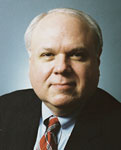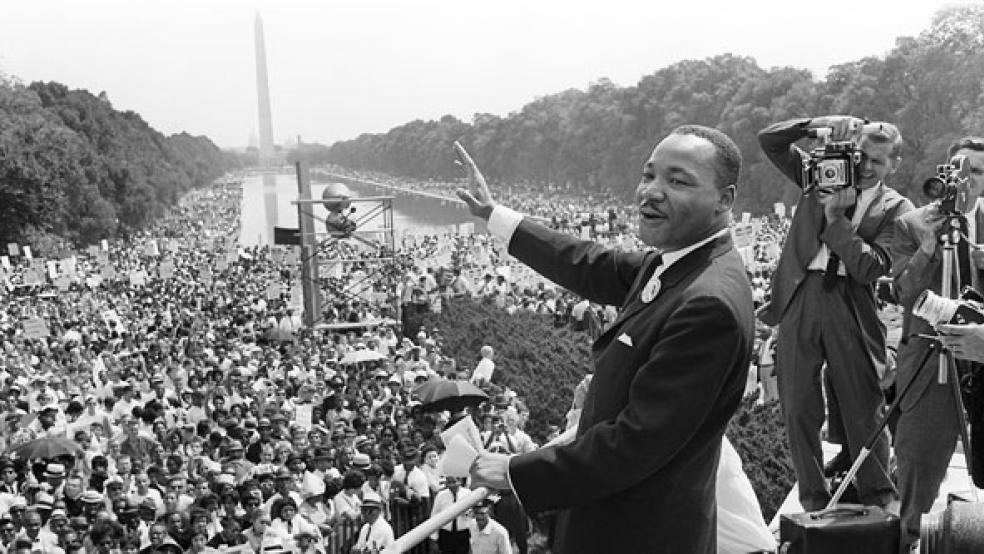Fifty years ago this month was the famous March on Washington led by civil rights icon Dr. Martin Luther King Jr. It was a pivotal event in the history of civil rights, without which the Civil Rights Act of 1964 and Voting Rights Act of 1965 may not have been enacted for many more years or in a much-diluted form.
It is now largely forgotten that the march was necessary to prod John F. Kennedy and a Democratic Congress into action on civil rights. Although he had promised swift action on the issue during the 1960 campaign, Kennedy had dragged his feet on anything meaningful as president.
The problem for Democrats was that the party was still based in the South and its members from that region were strongly opposed to civil rights legislation. Kennedy, looking ahead to a tough reelection race in 1964, needed to keep southerners on the reservation and that meant paying only lip-service to civil rights.
In truth, Kennedy had never been a strong supporter of civil rights. As a senator, he criticized the famous Brown v. Board of Education decision by the Supreme Court in 1954 and said that Congress had no role to play in desegregating the public schools. Kennedy voted against bringing the 1957 civil rights bill up for a vote in the Senate and supported amendments by southerners to weaken its effectiveness.
In preparing to run for president in 1960, Kennedy courted southern leaders such as Alabama Gov. John Patterson. When he got the Democratic presidential nomination he chose as his running mate Sen. Lyndon Johnson of Texas, who had long adhered faithfully to his region’s policy on civil rights. For example, in 1948 then-Congressman Johnson harshly attacked Harry Truman’s civil rights program as “a farce and a sham—an effort to set up a police state in the guise of liberty.”
What really gave Kennedy the reputation for being pro civil rights was an extremely astute political ploy—making a call to Dr. King’s wife Coretta after her husband had been jailed because of a civil rights demonstration in Atlanta? She feared for his life in a state where lynchings still occurred and was very grateful for Kennedy’s efforts to get the governor of Georgia to free Dr. King.
What made Kennedy’s action so clever was that he was careful to publicize it only in black newspapers—the news would have hurt him among white southerners whose votes he still needed. By contrast, Richard Nixon, who was also concerned about Dr. King’s fate, felt that as vice president it would be improper for him to intervene in a state’s law enforcement, a very unwise decision that probably cost him the election.
Kennedy promised a flurry of executive orders on civil rights as soon as he took office, but once in office did nothing. Although the civil rights acts of 1957 and 1960 had given the Department of Justice new powers to enforce voting rights in the South, the Attorney General, Kennedy’s brother Bobby, sat on his hands. As Bobby Kennedy put it, “I did not lie awake at night worrying about the problems of Negroes.”

Indeed, Bobby authorized the FBI to tap the phones and wire the rooms of Dr. King to dig up dirt on him. He also barred the Civil Right Commission from having access to Justice Department files to investigate voting rights abuses. Meanwhile, President Kennedy resisted naming supporters of civil rights to federal judgeships and often appointed opponents at the request of southern senators.
In early 1963, Dr. King said that Kennedy’s approach to civil rights represented nothing but “tokenism.” He resolved to turn up the pressure for action by initiating a new civil rights campaign in Birmingham, Alabama. It was dangerous because Dr. King knew there would be violence. But as he explained in his famous “Letter from Birmingham Jail,” the inevitable overreaction of the authorities against peaceful demonstrators was an essential step in escalating the civil rights struggle.
Dr. King’s risky strategy paid off. When the Birmingham police used firehoses and nightsticks on the demonstrators, it was recorded by television cameras and journalists such as Anthony Lewis of the New York Times. Their reports horrified northerners, who pressured Kennedy to act on civil rights and fast.
Finally, in June 1963, Kennedy proposed a civil rights act, two and a half years after taking office. But he did little to push the legislation, which many liberals thought needed to be stronger. That is what led to the March on Washington in August. Among those who spoke at that historic event was Rep. John Lewis of Georgia, who then headed the Student Nonviolent Coordinating Committee.
The whole point of the march, at which Dr. King gave his famous “I Have a Dream” speech on August 28, was to pressure Kennedy to become much more active in the civil rights struggle and put some real muscle behind his legislation.
Despite the paucity of his accomplishments in the area of civil rights, Kennedy was deeply mourned in the black community after his assassination in November 1963. Ironically, it was the catalyst for enactment of the Civil Rights Act of 1964.
The reason is that it led Lyndon Johnson to become president. Although he had opposed civil rights legislation in Congress, he changed his mind as president. It may simply be that he saw the inevitability of civil rights legislation and wanted to be on the winning side. In any case, Johnson was a vastly better legislator than Kennedy was and he threw himself wholeheartedly into getting the civil rights bill enacted, which was successful in 1964.
Kennedy’s death contributed to passage, as many Americans saw it as a tribute to his memory. But more than anything else, the Civil Rights Act passed because its time had come.
As important as the Civil Rights Act was in ending racial segregation and giving full rights to African Americans, it set in motion political forces that we are still living with today. In particular, it was the beginning of the end of the “Solid South” as the base of the Democratic Party; today it is as solidly Republican as it was Democratic before 1964.





